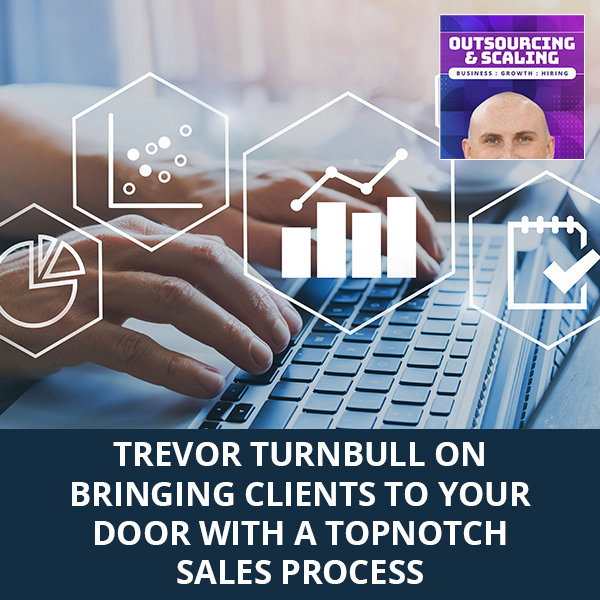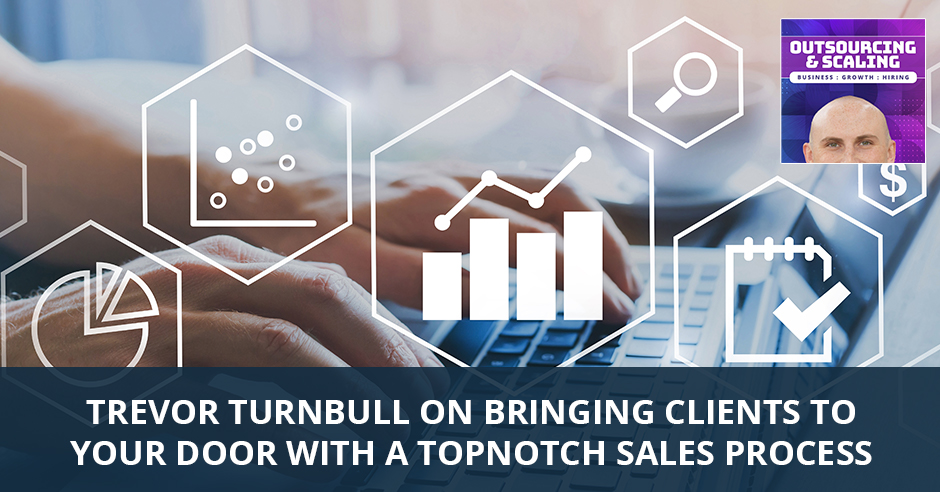


If you want your sales to increase, Trevor Turnbull is definitely the guy who can guide you to the path of higher ROIs. Trevor is the CEO of Linked Into Leads and the Founder of the transformative Expert Selling Machine programs. In this episode, he teaches you how to transition your typical sales days to better and smarter work weeks. He shares his sales programs that you can use to position yourself to bring the most valuable prospects to your door and generate more audience and sales. Having a team that you can run efficiently is key to more sales, and it all starts with hiring the best people and educating them about the right sales process. Trevor shares his hiring process, along with the traits he looks for in an ideal contractor.
—
Listen to the podcast here:
[smart_track_player url=”https://www.podetize.com/statsapi/www.podetize.com/wp-content/uploads/fileuploads/11-5b145ef137b51b3d1af0633e9305c43d/08/2019/9e24a45f6d38006485eaba2f7e660d72.mp3″ title=”Trevor Turnbull on Bringing Clients To Your Door With A Topnotch Sales Process” artist=”Nathan Hirsch” image=”https://freeup.net/wp-content/uploads/2019/04/OAS.png” ]
Download the audio file here.
Trevor Turnbull on Bringing Clients To Your Door With A Topnotch Sales Process
My guest is Trevor Turnbull. How are you, Trevor?
I’m good. How are you doing, Nathan? It’s good to be on your show here. I appreciate the opportunity.
For those who don’t know, Trevor is the CEO of Linked Into Leads and the Founder of the transformative Expert Selling Programs where he has empowered thousands of solo entrepreneurs to connect with their most valuable prospects and build a thriving business in life. He has served over 26,000 people with his proven client acquisition system. He shared his story and methods in numerous media publications including Forbes, Entrepreneur, Time, Money and Business Insider about how to go from stress, frustrated and overworked to confident, empowered and balanced in 90 days or less. Before we talk about all of that, let’s take a gigantic step back. Talk to me about what you were like growing up. Were you a rebel or you’re a straight-A student? Did you know you wanted to be an entrepreneur?
I don’t think I caught the entrepreneurial bug until university. I don’t have a story of selling lemonade on the side of the road or anything like that. I can define myself as an athlete growing up. I was a hockey player. I’m from Canada. I live in Vancouver, but I’m from the middle of Canada and Saskatchewan, which there’s only one thing to do when it’s freezing cold out all winter and that is to play hockey. I was a hockey player for years and years. By the time I dove into my business side of things, I had got a marketing degree and I took a few entrepreneurial classes. That’s where I started to figure out that was something I wanted to do and specifically in being able to present ideas and get involved in sales.
It naturally led to me starting my own business in 2006 with the encouragement of a friend who handed me The 4-Hour Workweek and The E-Myth book. It’s the usual required readings for new entrepreneurs. Like many people I’m sure that are going to be reading this, I’ve stumbled my way through many things. I’ve made a lot of mistakes along the way. Part of my mission now is to serve solopreneurs that were like me for many years, to cut the learning curve a bit and not work so darn hard. You already alluded to it. We’re workaholics by nature. We want to work hard as entrepreneurs, but there are smarter ways to go about it. That’s what we do now, serve people to help them with that.
How do you even begin to take someone? Let’s say you’ve got a business owner. They’re working 70 to 80 hours a week. I’m assuming their personal life isn’t where they want it to be. It’s tough to balance both when you’re working that much. What’s normally your starting point to get them to that point where they can start transitioning to a better and smarter work week?
If I’m being honest, usually it’s a mindset shift. It has nothing to do with systems and processes and tools and everything else. It has to do with how you see being an entrepreneur and how you can think differently so that you don’t become a micromanaging, stressed-out “I have to do everything or else it’s never going to get done right” person. It’s not true, especially in this world. Everybody that’s reading this knows your business and what you guys do. I’m a huge advocate for figuring out what you do best and doubling down on that and then finding ways to get everything else off your plates as efficiently as possible. Getting that mindset in the right space requires mentorship and requires looking at what you do for a living and see how to do it differently.
Every single person is a salesperson whether they want to believe it or not.
A lot of the people that we serve as an example are older. They’re Baby Boomers in many cases. They’ve come from a career of say twenty to 30 years in the corporate world and now they’re about to retire. They’ve got bitten with the entrepreneurial bug and they say, “I’m going to go and do this myself.” They don’t know how to market themselves. They don’t know how to sell what they do. They certainly don’t know how to do all the technical aspects. Instead of trying to teach them how to build websites and landing pages, set up booking tools, use Zoom and all these different tools, we teach them how to learn the basics of understanding how to use these things, but then have other people leverage to do a lot of the work for them.
You have the mentality that sales is king. I know you’ve founded Expert Selling Programs. Is it all about the sales and everything else you can hire or is that not really?
The reason why we came up with term and the name of our program, Expert Selling, is I believe every single person is a salesperson, whether they want to believe it or not. Especially if you’re a solopreneur and you’re in charge of your revenue, you are the salesperson until you start to outsource that too. Shifting the mindset about what sales means, where it doesn’t have to be this dirty word where you’re trying to trick people or get them to convert based on some limited time offer or something, but instead find good alignment towards serving a pain point that a potential client has is critical.
Our programs are not 100% all about the sales process, overcoming objections, closing on the phone and that type of thing. It is about how you can position yourself to bring the most valuable prospects to your door. Have them fully educated on exactly what you do, how you can serve them and nail down those pain points that they have and what solutions you have to offer so that the sales process becomes more of an enrollment conversation like, “Here’s what you need. Here’s what I can do for you,” and look at, “We can fill a gap right there.” We spent a lot of time on sales because it’s a necessity in order to have a thriving business. We also want to take the stigma away from it being a bad thing because it’s not. It’s critical to your success.
A lot of people get in the mentality of not wanting to be the used-car salesman so they don’t do sales. Maybe they are doing sales, but they’re doing it in a way that most people don’t approve. My next question is where do you see most people going wrong when it comes to sales besides not doing it at all?
In the sales process that we teach, a lot of times it’s about active listening skills. We can talk about this from a business perspective as well as a relationship perspective. I know you got engaged so you know all about this too. Relationships, being able to actively listen to what’s being said and articulate it back, like paraphrasing back to that person so that they know that they’ve been understood and heard is a critical component to a sales process. We spend a lot of time talking about that and also practicing it too. We do a lot of role-playing in our group calls and whatnot when we’re talking about the sales process and that’s a key piece to making it work for anybody that’s going to be working for themselves.

Let’s shift the focus a little bit. You talked a lot about outsourcing and taking tasks off your plate. Do you remember who your first hire was and how that went?
It’s been a lot of years now. I’ve been doing this since 2006 or so or probably earlier than that. The first time I hired a VA probably would have been a web developer back in 2010 or so. It’s been many years ago and it was a disaster. Mostly because the platforms, the marketplaces, the ability to communicate and pay, all these different things weren’t up to speed back then. It opened my eyes though to the possibilities. I’ve spent a lot of time educating myself not only on how to go and find good talent but how to screen them, train them, manage them, know when to get rid of them sometimes too, which can be very stressful for people as well to know when to cut the cord when things aren’t working out. I don’t know exactly what the first hire was, but I can tell you it wasn’t pretty. I learned the hard way.
Any particular horror story that stands out from your many years of hiring?
We’ve had experiences along the way. Whenever you’re dealing with web developments, you’re all the time dealing with sensitive information of servers and login information for sites. I had some bad experiences in the past and this was years ago. I get to take full responsibility for why it happened where one of my sites got hijacked and taken over. That’s not to scare anybody away from that, but it was because I didn’t do a good vetting process. I was honestly desperate for somebody to help me. Before I knew it, things were taken over and we were in a situation where I couldn’t get access to my own site. There are so many tools to be able to mitigate the risks and everything that is associated with that. The truth be told too, with the proper vetting process, you end up hiring some pretty amazing people.
That’s the one thing that I’ve learned over the years is that I’ve stopped thinking about outsourcing as just this tool for my business. Instead, these are real people that are highly skilled, that are passionate about what they do, that have families on the other end of the computer, on the Slack channels and the Facebook groups and everything else. When you start treating them like real people, they show up and they perform for you because they want to do a good job. They want to get a good way. It’s been an interesting experience over the years. It seems like it’s getting easier and easier and that’s why a company like yours has popped up as well as other ways for people to be able to go and hire quality people from around the world.
I have a client who for years, we’ve had the same issue where just the way she talks to people in emails via Skype makes no one want to work for her. She’s hasn’t been able to grasp that nothing else matters. Your SOP doesn’t matter, what your training is or whatever if you can’t get people to want to work with you and talk to them like they’re human beings and that would be step one. What do you look for when you’re hiring someone? Let’s say you have a job, you have an opening or you’re posting on FreeeUp, you’re posting wherever, what is your vetting process like?
The biggest things are probably open communication like making sure that there’s timely communication happening. The one thing, especially with hiring people in the Philippines is that I’ve experienced shutdowns of internets. They have crazy storms over there and unsecured internet services and stuff sometimes that they go down. When I first started doing this, I always wondered like, “Is this real? Are they actually shutting down for four days here?” Even also around religious holidays and that type of thing too. That was an area that I didn’t understand when I first started doing this work. Once I understood the rules of the engagements and how people structure their work weeks and months and years around those kinds of things, I started to adapt to it and allow it to be a part of my process too.
Sales is a necessity in order to have a thriving business.
Anyways, going back to what you were saying though, good communication and attention to detail right off the start is critical. Also, our onboarding process is more than like, “Here’s your SOP, you go do this job.” It’s more about “Here’s our vision. This is what we’re creating and you’re going to be a part of that.” Because we want them to feel invested in what we’re doing, not just working a job. Even if it is a means to an end, I want people to be a part of a team that is working to something greater. It inspires people a lot more to work harder and to feel like they’re a part of something as well.
I always tell people at the beginning when they hire people. Before you dive into A, B, C and D, tell them about your business. Tell them about your goals. Tell them about what didn’t work with the past hires. Tell them about what you’re looking forward to doing with them in the future. All that stuff is important. No one wants to be handed something, get it done and then be handed the next project without any idea of how it impacts. You talked a little bit about outsourcing sales. I think that’s where a lot of people struggle a lot. A lot of people try to outsource it too early or even on the flip side, too late. What does that look like to you? If someone wants to outsource their sales process, where should they be at and what are the steps to do that?
It depends on which part of the sales process we’re talking about. We have multiple steps to a sales process. That’s not just the phone call, but rather how we’re qualifying people before they get on calls, how we’re keeping track of our data inside of our CRM. All of those things can be outsourced. We do outsource pieces of them as far as the building of a sales pipeline and communications. We do a lot of work with LinkedIn. We use VA’s for LinkedIn, for example. We can see that if we connect with somebody today, knowing that our sales cycle might be six to nine months, that those VA’s can help us greatly in educating and moving the sales process along. As far as actively having a virtual assistant doing calls, we haven’t gone down that path yet.
I feel like it’s something that you have to keep internal and do yourself, which is why we talked about getting good at selling even if you don’t think you’re a salesperson. What we’ve started to do is put the two-step call process together where the first step is three questions that we asked that person to try and find out if they were a fit or not. If we’re not, we’ll point them in a different direction. If we are, then we’ll get on a more detailed strategy call with somebody like myself or a salesperson on our team that can dive a little deeper into exactly how we can serve them best, not just can we serve them or not. We’ve started to outsource that where I have a guy in Indonesia who takes all of our first calls, with prospects to figure out whether or not it’s a fit. If it’s not, we don’t want to waste either person’s time. It’s working out good so far and we’re going to see how we can further expand on it in the future here too.
You seem like someone that does all that little bit of trial and error. You like to try different things and hire people for different spots. Is that accurate?

Anytime we’re doing anything in our business, we’re always documenting and we’re seeing where we can procedurize something with either software or a human being. If we can, we’re constantly trying to figure out how to fit. We choose one audience and we dial it in. The book, The ONE Thing. We’re not a certified whatever from that book or what those guys do but a lot of what they speak about rings true with how we teach as well. Dialing in that one audience means how can you clearly articulate who you serve, how you serve them and why they should trust you? How they can find out more information, knowing that when you get granular, it becomes very obvious for the other person, the prospect to go, “That’s me?”
It also becomes polarizing in the sense that if you’re used to having multiple different clients in a variety of industries and all that stuff, that you feel this internal acts of “I can help everybody in the world.” Sure you can, but in this age especially with what we’re dealing with digital marketing and how many people are becoming coaches and consultants out there. If you don’t find a way to differentiate yourself and become a true expert at one thing for one audience, with one offer, with one campaign type to be able to convert that audience, you end up getting bunched into that sea of fish. You don’t become that big fish in a small pond as they say. Getting clear on that avatar and part of that process comes down to understanding your own personal values, the people that you want to work with, as well as your mission and your vision.
All these things tie into how you can define that customer’s avatar and then create marketing materials, landing pages, email, outreach, social content, advertising, everything that speaks to that one audience. There are a lot of pieces to it, but I believe it’s a critical component to anybody that wants to be successful nowadays as an online entrepreneur or an offline entrepreneur, whatever you want to call it. As somebody that is a solopreneur running their own business. You’ve got to get dialed in.
I want to talk a little bit about LinkedIn because LinkedIn is a tool that I use a lot. I’m sure I’m not maximizing it to its full potential. I bet a lot of the readers are not either. It sounds like you’ve figured out how to start your lead process in LinkedIn. Anything that you can share about that on what’s worked for you?
I’ve been doing LinkedIn training for many years. We’ve had over 26,000 people go through our trainings with different products that we’ve sold over the years. LinkedIn at its core is a big database of business professionals that are willing to fill in their information about who they are, where they’re located, what industry they work in or what their job title is. Learning how to leverage that tool in an authentic way where it’s not about automated, spammy bots marketing, but instead, it’s about building authentic relationships with your perfect clients. When you dial into that audience, you can do active outreach on LinkedIn to get connected. LinkedIn is not a sales tool. LinkedIn is just the source. It’s the opportunity to go and find the right people. It’s all the pieces and behind like your campaigns, your funnel that you might create, the way you communicate with them through other sources that is critical to the success.
LinkedIn is not for sales but a source of opportunity to go and find the right people.
At its simplest, with LinkedIn, what I advocate for is to get connected first degree with those prospects and then focused on serving them with value as well as collecting information. We talked about this concept of selling value. You are selling value in the form of content, blog posts, videos, podcasts like this. You’re serving the community or your audience that way where they can serve you. Selling value is giving you their time and giving you data, giving you insights into what’s going on with their business. Think of LinkedIn that way as a market research tool and an opportunity to expand your network to get referrals. It’s not a sales tool. The sales process happens outside of LinkedIn. A lot of times people make that mistake and they go too hard using LinkedIn as a means to sell and it doesn’t work. It usually turns people off more than anything.
I think we’ve all been spammed by people on LinkedIn. What did I miss? Anything else that you want to share with the audience?
More than anything, when we connected, I can’t even remember exactly how we connected, but it’s funny how these things happen. We’ve been doing outsourcing now for years, but it’s been within 2018 when we started to dial in the process of finding, screening, hiring, training, managing, firing, rehiring and really dialing all that in. One of the frustrations that I know a lot of people have expressed to me and I’ve even expressed that myself, is having a place to turn to pre-vet your candidates. I know this is what you do and I know we’re going to have to talk about integrating your service into our program too. Because when we do outreach on LinkedIn, for example, we’re asking our ideal clients like, “Where are you struggling right now?” They’ll tell us, “Technology, I need a copywriter, I need a designer, I need a developer.” All these things and for the longest time I thought, “Let’s go teach people how to do that.” The truth is most people don’t want to learn it, but they need to understand it well enough to be able to hire somebody to train that person to have them take it over.
The last thing I’d leave people with is that if you’re reading this, you’re exploring the idea of outsourcing right now. I want you to know that it is probably the most liberating thing that you can do in your business. It’s like a main focal point for what we do in our program. It’s why I was super excited to get connected with you because I know you have dialed in that process of vetting, screening, hiring, training, managing to an even greater level than we had. I’m super excited to start integrating what you have in our program as well.
We’re looking forward to working with you as well. Where can people find out more about you? What are you most excited about in 2019?
You can go to ExpertSelling.com. We are launching our online program that’s going to include mentoring and coaching, as well as access to all these different databases of pre-vetted freelancers and tools that we use in our business. You’ll find all the information that you need on that page. Connect with me on LinkedIn. That’s what this is all about. If you do let me know that you saw me on this show. It’s always great to see some insight as to where people are coming from so that I have some context as to what you might need help with the most as well. I’d be happy to connect with anybody, just search me on LinkedIn.
Thanks, Trevor.
Important Links:
- Trevor Turnbull
- Linked Into Leads
- Expert Selling
- The 4-Hour Workweek
- The E-Myth
- The ONE Thing
- ExpertSelling.com
- LinkedIn – Trevor Turnbull
About Trevor Turnbull
 Trevor Turnbull is the CEO of Linked Into Leads and the Founder of the transformative Expert Selling programs where he has empowered thousands of SOLOpreneurs to connect with their “Most Valuable Prospects” and build a thriving business & life.
Trevor Turnbull is the CEO of Linked Into Leads and the Founder of the transformative Expert Selling programs where he has empowered thousands of SOLOpreneurs to connect with their “Most Valuable Prospects” and build a thriving business & life.
He has served over 26,000 people with his proven client acquisition system and has shared his story and methods in numerous media publications including Forbes, Entrepreneur, Time Money & Business Insider about how to go from Stressed, Frustrated & Over-Worked to Confident, Empowered & Balanced in 90 days (or less)
